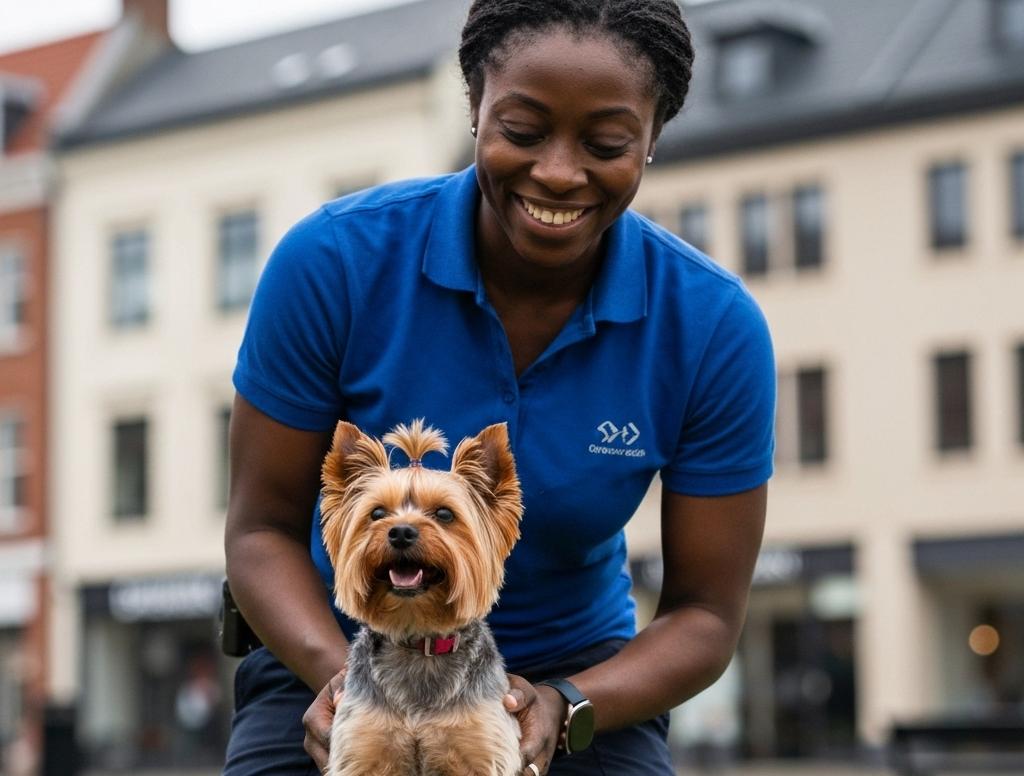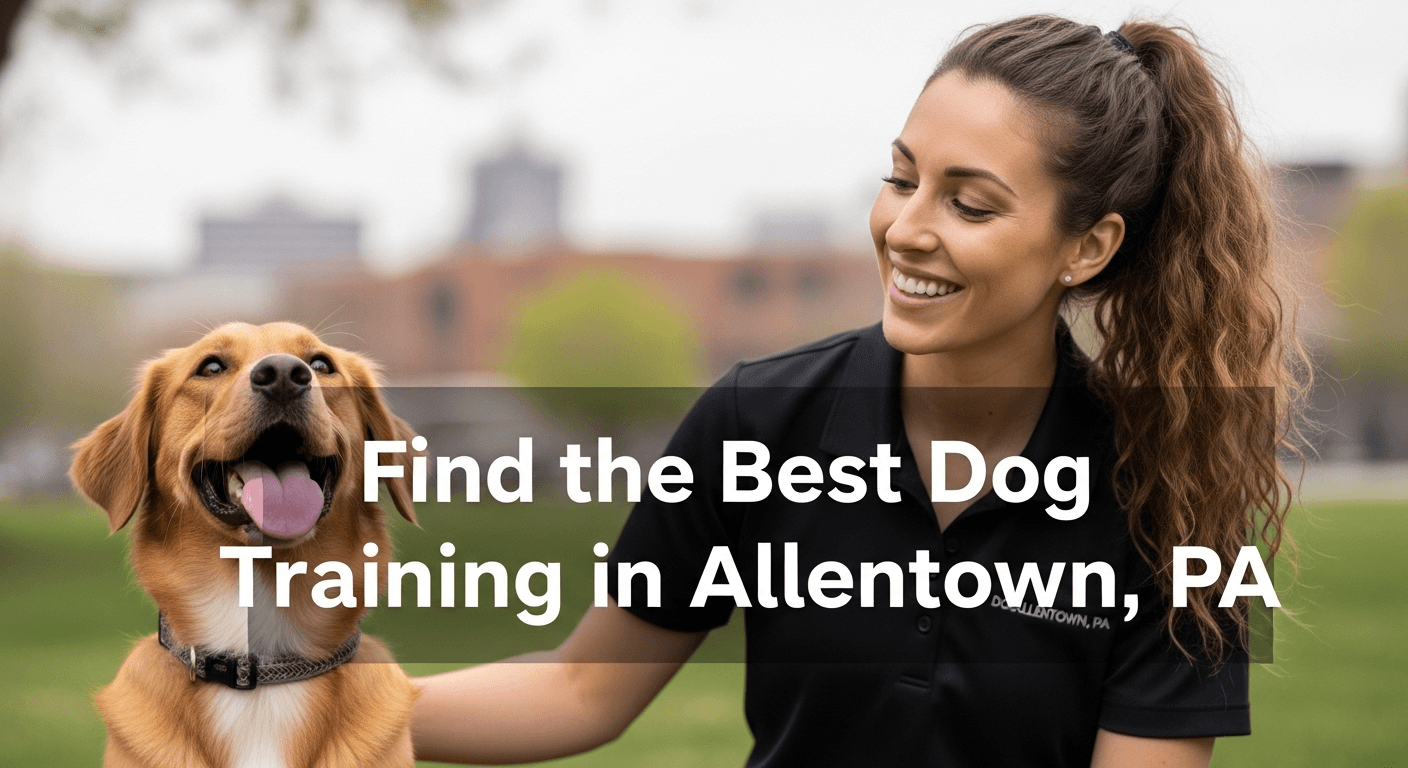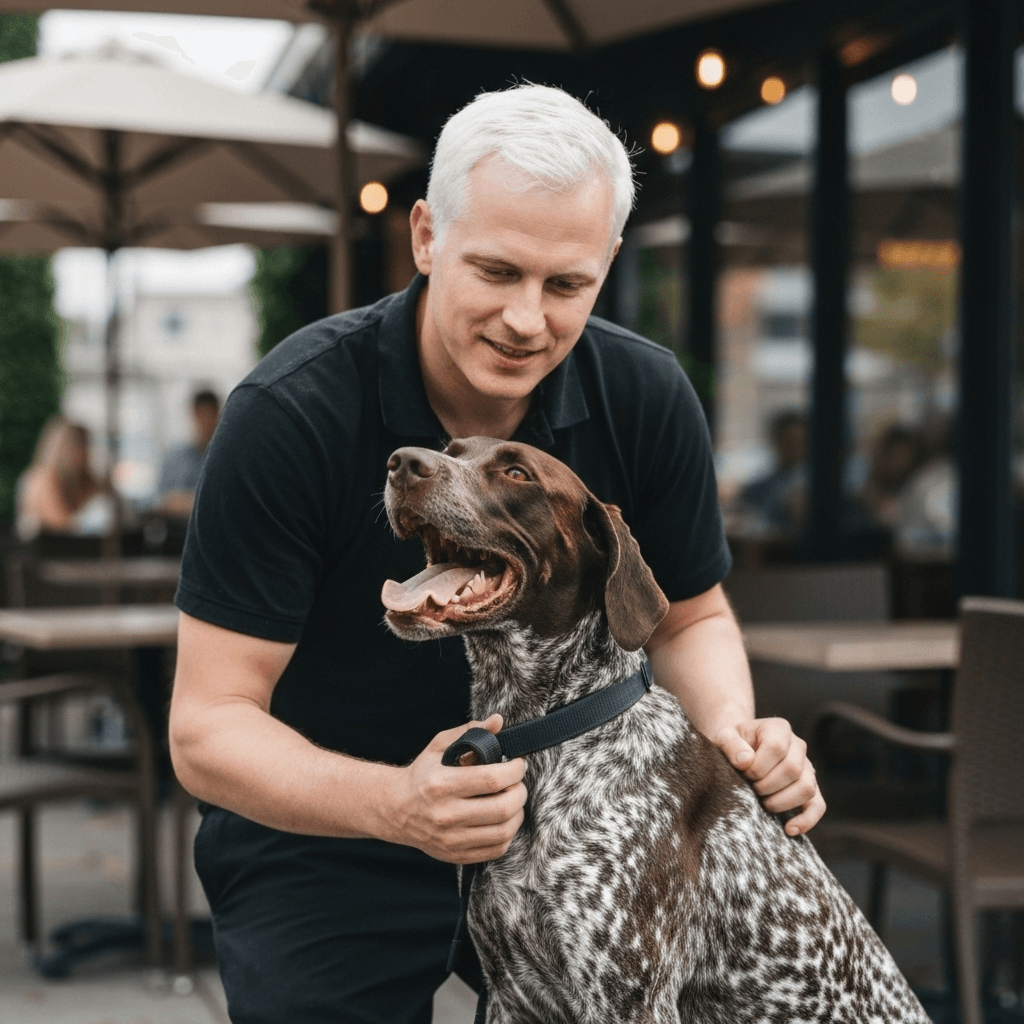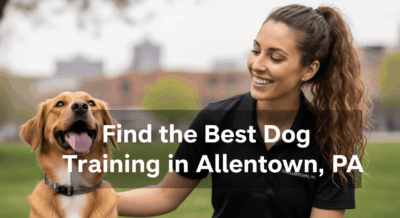Your Complete Guide to Choosing a Dog Trainer in Allentown
When you’re walking your dog through downtown Allentown or spending Saturday morning at the Allentown Fairgrounds Farmers Market, you want a pup who stays calm and focused. Training in this city means preparing for busy sidewalks near the PPL Center, weekend crowds at Trexler Memorial Park, and all the distractions that come with Lehigh Valley life.
The difference between a well-behaved dog and a stressed-out walk often comes down to finding the right local trainer who understands city living. Your dog needs skills that work on Hamilton Street just as well as they do in your living room.
How to Choose the Right Trainer
Start by thinking about where you actually spend time with your dog. A trainer who only works in sterile indoor spaces might not prepare your pup for the real challenges you face – like staying calm when a cyclist whizzes by on the Lehigh Parkway or not jumping on kids at Cedar Creek Parkway.
Look for someone who uses positive reinforcement training and can work with you in different settings. Many Allentown families live in rowhomes or apartments, so flexibility with in-home lessons matters. You want a trainer who can help with barking at apartment hallway sounds just as much as loose-leash walking downtown.
If your dog has bigger challenges – maybe they get anxious in crowds or reactive toward other dogs on narrow sidewalks – ask about behavior modification experience. The best trainers collaborate with veterinarians when needed and avoid quick fixes that don’t actually solve the problem.
When it comes to credentials, you have options. Professional certifications like KPA-CTP, CPDT-KA, IAABC-CDBC, or CTC show a trainer has invested in their education. But the most important thing is finding someone who communicates clearly and makes both you and your dog feel comfortable.
Common Dog Training Methods Explained

Living in Allentown means your dog needs skills that hold up in busy, unpredictable places. The methods that work best here are the ones that build your dog’s confidence rather than shutting them down.
Positive reinforcement rewards the behaviors you want to see more of. When your dog sits politely instead of jumping on someone at the park, they get a treat or praise. This approach works especially well in social city settings because it teaches your dog that good things happen when they make good choices around people and distractions.
For dogs who get overwhelmed or reactive, trainers often use desensitization and counterconditioning. This means gradually exposing your dog to triggers (like other dogs or street noise) while keeping them comfortable and rewarded. It takes patience, but it’s incredibly effective for dogs who struggle with Allentown’s busy atmosphere.
Puppy training focuses heavily on socialization – helping your young dog learn that the world is generally a safe, interesting place. Good puppy programs also cover potty training and teaching calm greetings before you start taking your pup to higher-traffic areas.
Every city dog needs solid leash training and basic obedience. Whether you’re navigating downtown crosswalks or following leash rules at local parks, these skills keep everyone safe and make outings more enjoyable.
For more complex issues like separation anxiety, the best approach is usually a gradual plan that slowly builds your dog’s confidence about being alone. Quick fixes rarely work for emotional problems, so expect this kind of training to take time and consistency.
Stay away from trainers who rely on intimidation, shock collars, or “dominance” methods. Modern dog obedience training builds trust between you and your dog, which creates lasting results you can count on.
Average Cost of Dog Training in Allentown PA (Updated for 2025)
Training costs in Allentown and Lehigh County depend on several factors: the trainer’s experience, what type of program you choose, and how far they need to travel for in-home dog training sessions.
Here’s what most dog owners in the area are paying right now:
| Service Type | Typical Price |
|---|---|
| Group classes, 4 to 6 weeks | $150 – $275 |
| Private lessons, 60 minutes | $95 – $160 per session |
| In-home training, 60-90 minutes | $110 – $175 per session |
| Puppy classes, 4 to 6 weeks | $150 – $250 total |
| Day training, 2 to 4 sessions per week | $400 – $850 per week |
| Board and train, 2 to 4 weeks | $1,900 – $4,200 total |
| Behavior consult for reactivity or fear | $130 – $220 for initial session |
You’ll typically pay more for complex behavior cases, weekend appointments, or if you live outside core Allentown neighborhoods in townships like South Whitehall, Salisbury, and Upper Macungie.
Many trainers offer package deals that reduce the per-session cost. When you’re comparing prices, ask what’s included, how they measure progress, and what kind of homework you’ll need to do between sessions.
Local Laws and Requirements in Allentown and Lehigh County
Understanding local rules helps you train more effectively and avoid problems when you’re out with your dog.
Dogs must be under control and leashed in public spaces unless posted otherwise. This applies throughout Allentown and affects how you can practice training in public areas. For specific questions about enforcement, contact Allentown Animal Control.
Pennsylvania requires dog licensing for dogs 3 months and older, handled through Lehigh County. You’ll also need current rabies vaccination, as outlined in Pennsylvania's rabies vaccination requirements.
City and county parks generally allow leashed training practice, but commercial classes may require permits and proof of insurance from the organizer. If you’re planning to practice in parks beyond Allentown, check the pet rules for state-managed lands through Pennsylvania state parks guidelines.
Pennsylvania doesn’t require specific trainer licensing, but reputable trainers carry general liability insurance. Many venues require this coverage for group classes or events. For broader context about statewide regulations, visit Pennsylvania Dog Law.
Questions to Ask a Potential Dog Trainer

Before you commit to working with someone, make sure they’re the right fit for your specific situation:
- What methods do you use, and how do you keep training positive and low-stress for my dog?
- What education or credentials do you hold, such as CPDT-KA or KPA-CTP?
- How will you customize a training program for busy Allentown settings like downtown sidewalks and market crowds?
- Do you offer private lessons, group classes, or day training, and which suits my goals best?
- How do you measure progress and decide when to add distractions?
- What’s included in the package, and are there travel, cancellation, or equipment fees?
- Do you carry liability insurance, and can you provide proof?
- For behavior issues, do you coordinate with veterinarians or a behavior specialist, such as someone with IAABC-CDBC or CTC background?
- What daily practice should I do to help my dog between sessions?
Local Allentown Resources for Dog Owners
Once your dog has some basic skills, these spots around town are great for practice and socialization:
The Upper Macungie Township Dog Park in Breinigsville offers fenced areas that are perfect for working on recall in a safe environment. Monocacy Dog Park in Bethlehem has separate sections for large and small dogs, which helps with controlled socialization. Easton Dog Park provides another fully fenced option for off-leash practice.
For leashed training, try the trails at Trexler Nature Preserve (check visitor information first), Lehigh Parkway, or Jordan Park. These wider paths are ideal for practicing loose-leash walking and working on reactivity issues. Cedar Creek Parkway tends to be calmer, especially on weekday mornings, making it good for polite greeting practice.
Always follow posted rules and keep dogs leashed outside designated off-leash areas. Remember that even in dog parks, your dog should be under your control and responding to basic commands.

Common Questions
How much does in-home dog training cost?
Most Allentown trainers charge between $110 and $175 per in-home session. The final price depends on how far they need to travel, their experience level, and how long each session runs.
Is in-home dog training worth it?
Absolutely, especially for household issues like barking at the door, jumping on visitors, or apartment-specific problems. When trainers can see exactly where the behavior happens, they can give you much more targeted advice that actually works in your space.
Can you pay someone to house train your dog?
Yes, many training programs include potty training and help you establish better routines. But remember that even with professional help, you’ll need to be consistent with daily practice to see real results.
What is the 3-3-3 rule for dog training?
This guideline suggests that new dogs need about 3 days to decompress from big changes, 3 weeks to start learning your routines, and 3 months to feel truly settled in their new environment. It’s a helpful reminder to be patient and keep training positive, especially with rescue dogs or puppies.
How long will it take to reach my training goals?
Basic manners like sitting politely or walking on a loose leash often take 4 to 8 weeks with consistent daily practice. More complex issues like separation anxiety or working with reactive dogs can take several months of gradual progress.
What should I bring to group classes?
Pack a flat collar or harness (no choke or prong collars), a standard 6-foot leash, high-value treats your dog loves, water, and vaccination records if the trainer requests them. Leave retractable leashes at home during dog training classes – they make it harder to maintain good control.
What’s the leash law in Allentown?
Dogs must be on leash and under control in all public spaces unless there are signs specifically allowing off-leash activity. For enforcement questions or specific situations, contact Allentown Animal Control.
Do I need a dog license in Allentown or Lehigh County?
Yes, Pennsylvania requires annual licensing for all dogs 3 months and older. You handle this through the county treasurer’s office – see Lehigh County dog license information for current requirements and fees.
What shots does my dog need in Lehigh County or Pennsylvania?
Rabies vaccination is required statewide for dogs 3 months and older. Your vet can give you current details, or check Pennsylvania rabies vaccination requirements for official guidelines.
Are dog trainers required to be licensed in Allentown or Lehigh County or Pennsylvania?
No special trainer license exists in Pennsylvania. Trainers follow standard business regulations, and those running classes in public venues may need permits and liability insurance. For broader legal context, see Pennsylvania Dog Law.
Where can I practice off-leash recall?
Stick to fenced dog parks like Upper Macungie Township Dog Park or Monocacy Dog Park. Never let your dog off-leash in public areas that aren’t specifically designated and posted for off-leash use.
Which dog parks allow training around Allentown?
Upper Macungie Township Dog Park, Monocacy Dog Park, and Easton Dog Park generally welcome casual training as long as you follow posted rules and keep your dog under control. Just remember that dog parks can be overstimulating for reactive dogs or those still learning basic skills.
What beaches or trails allow dogs for training?
We don’t have ocean beaches here, but many regional trails and state parks welcome leashed dogs. Always check posted rules first, including Pennsylvania state park pet policies and specific guidelines at places like Trexler Nature Preserve.
Do service or therapy dog programs have special rules?
Service dogs have public access rights under federal law, but the training process is extensive and highly individualized. If you’re interested in service dog training foundations or therapy work, ask trainers about their experience and whether they refer to specialists with advanced credentials like CBCC-KA for complex behavior issues.
The right trainer makes all the difference between frustrating walks and enjoyable adventures around Allentown. Look for someone who uses humane methods, communicates clearly, and understands what it’s really like to live with a dog in this city. With good support and consistent practice, you and your dog can confidently handle everything from neighborhood strolls to busy Lehigh Valley outings.
